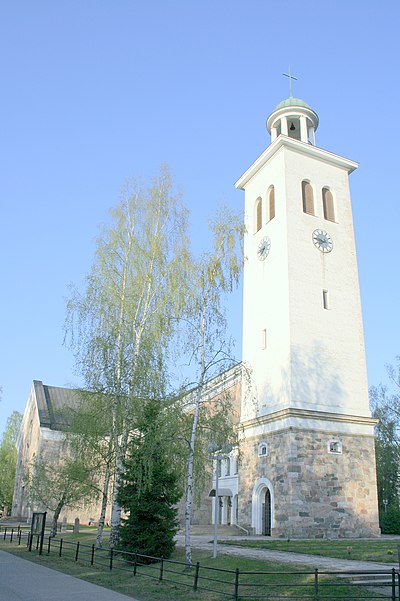
Search
Orimattila

Orimattila (Finnish pronunciation: [ˈoriˌmɑtːilɑ]) is a town in Päijänne Tavastia region, Finland. The southern part of Lahti is connected to the village of Orimattila, which is located in the region of Pennala. There are also several municipalities in the area, such as Iitti, Kärkölä, Lahti, Mäntsälä, and Pukkila.
Orimattila has a population of 15,669 (31 December 2023), and it covers an area of 814.01 square kilometers of which 28.87 square kilometers is water. The municipality is also unilingually Finnish. Its per-capita population is around 20.14.
The subject of the coat of arms of Orimattila, "a stallion horse carrying a scythe", refers to both the name of the municipality and local agriculture. The name itself comes from a house called Orhimattila, hosted by Henrich Mattzsson Orhimattila, which was already written in a 1573 book of judgment. The coat of arms was designed by Ahti Hammar and approved by the Orimattila Municipal Council at its meeting on September 15, 1956. The Ministry of the Interior approved the use of the coat of arms on December 17 of the same year.
Results of the 2021 Finnish municipal elections, resulted in the True Finns being the largest group on Orimattila council, in Orimattila.
History
The area of Orimattila contains Finland's oldest known settlement.
Orimattila gets its name from a local farm, established by Matti Laurinpoika in 1539. His estate was known as Orih-Mattila. As a village, Orimattila was first mentioned in 1561 as Orihmattila. A chapel community was established in the late 1500s, and it became an independent parish after it was separated from the neighboring parish of Hollola in 1636. The parish and its main settlement were still known as Orihmattila until the 19th century. Orih is an older pronunciation of the word ori meaning "stallion", though the loss of the h in place names was prevented by the element after it, in this case -mattila (cf. Orivesi, also called Orihvesi until the 19th century).
During the Great Northern War, which was caused by the Russian occupation of Finland, the parishes of Orimattila and Hollola were temporarily united. The following year, the bishop of Orimattila was forced to collect taxes from the neighboring parish of Hollola, which was then taken over by the bishop of Stockholm.
Many immigrants from the Kirvu region were settled in Orimattila as a result of the Continuation War. Orimattila became a town in 1992. In 2009, the municipality decided not to participate in the merger negotiations between the municipalities of Artjärvi and Orimattila, and on March 22, 2010, the two municipalities merged.
Population trends
The following diagram shows the city's population development over the past five years. The region where the city is located is used according to the situation on January 1, 2017.
Famous people
Culture
- Selma Anttila, Writer
- Roni Back, YouTuber
- Miklu, Ex-YouTuber, Musician, Writer
- Kaj Chydenius, a composer, is staying in the village
- Eero Erkko, Member of Parliament 1907–1918, newspaperman
- J. H. Erkko, poet
- Eki Jantunen, musician
- Aki Kaurismäki, film director
- Mika Kaurismäki, film director
- Jukka Lehtinen, sculptor
- Paavo Melander, composer/lyricist
- Pentti Papinaho, sculptor
- Annika Siltaniemi, Tenavatähti winner
- Helmi Vuorelma, founder of the weaving company
Athletes
- Taito Haara, power and weight lifter
- Kristiina Mäkelä, triple jumper
- Satu Mäkelä-Nummela, Olympic shooting gold medalist (women's trap)
- Jaakko Tuominen, hurdler
Other famous people
- Yvonne de Bruyn, Miss Finland
- Vesa-Matti Peltola, sports expert
- Oskari Rajanen, sales advisor
Twin towns — Sister cities
Orimattila is twinned with:
- Weißenburg-Gunzenhausen, Germany
- Östhammar, Sweden
- Jõgeva, Estonia
- Valka, Latvia
See also
- Artjärvi
- Myrskylä
- Pukkila
References
External links
Media related to Orimattila at Wikimedia Commons
- Orimattila travel guide from Wikivoyage
- Municipality of Orimattila – Official website (in Finnish)
Text submitted to CC-BY-SA license. Source: Orimattila by Wikipedia (Historical)
Articles connexes
- Päijät-Häme
- Aki Kaurismäki
- Judo
- Artjärvi
- Shadows in Paradise (1986 film)
- Lapinjärvi
- Mika Kaurismäki
- Porvoonjoki
- Albert Kallio
- Municipalities of Päijät-Häme
- List of cities and towns in Finland
- Scythe
- Southern Finland Province
- List of world records in masters athletics
- List of urban areas in Finland by population
- List of world under-20 records in athletics
- Pöyrysjärvi (Myrskylä)
- Google Street View coverage
- List of zoos by country
- Niemi
Owlapps.net - since 2012 - Les chouettes applications du hibou



